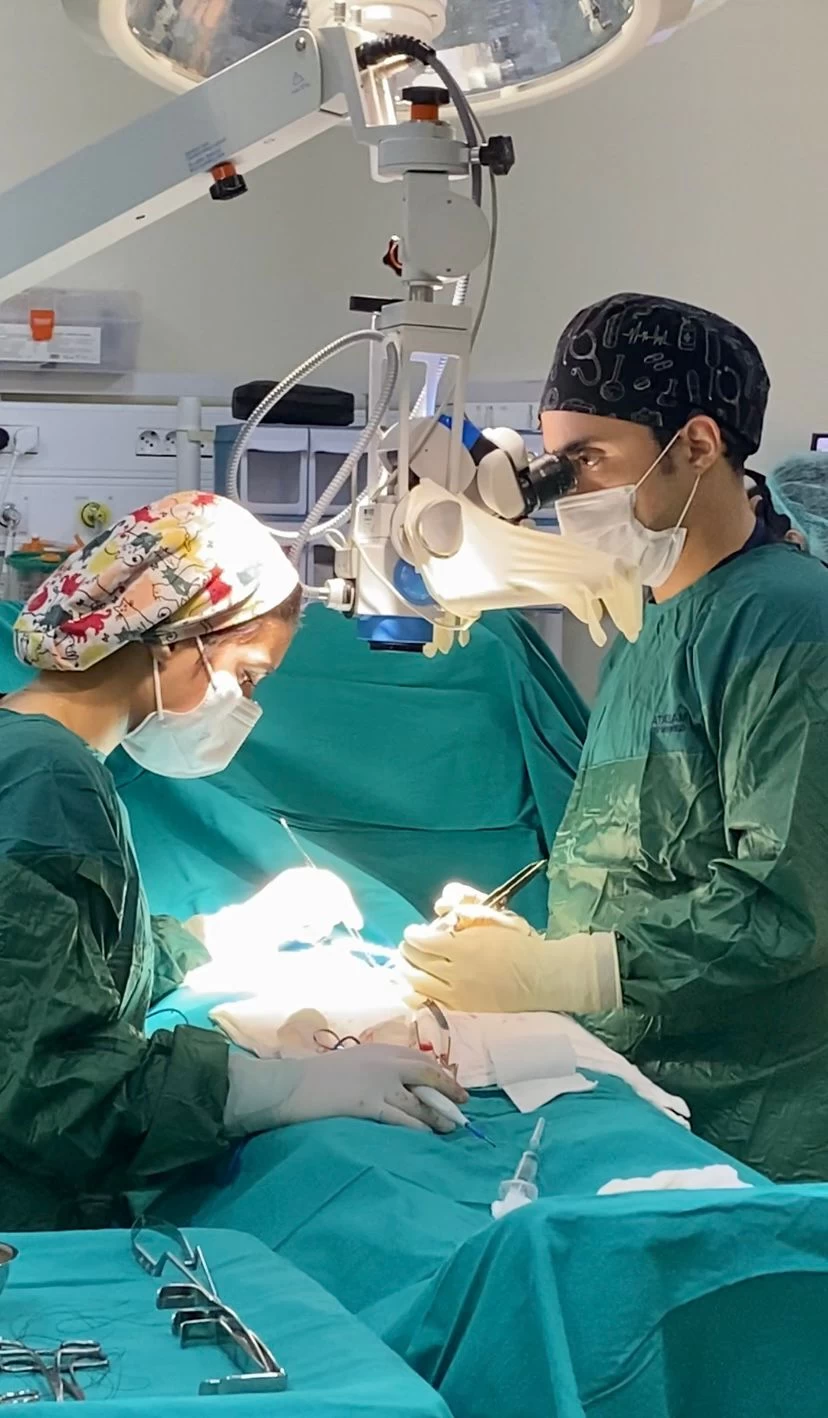
What is Varicocele?
- What is Varicocele?
- How Often Is It Occurred?
- What are the harms?
- How Is It Diagnosed?
- How is the treatment?
- What is the Success Chance of the Surgery?
- Surgery or IVF Treatment?
- What is the Operation Process?
One of the most common causes of male infertility: VARICOCELE
The veins carrying the dirty blood from the testicles become varicose by enlarging and this causes the veins to not be able to fulfill their blood-carrying duty in a healthy way. This condition causes a disease medically called varicocele. Varicocele can cause impaired blood flow in the testicles and the inability of the testicles to perform their healthy functions. Therefore, varicocele treatment in men is important and should be diagnosed early to avoid serious consequences. Due to the dirty blood accumulating in these veins, enlargement of the veins and a bulging appearance that can be seen even from the outside occurs.
How Often Is It Occurred?
Varicocele is a condition seen in 15-22% of adult men. However, it occurs in 30-40% of men who have trouble conceiving, and it is one of the most common causes of male infertility. Although it is more common on the left side, it can be seen in both testicles. Varicocele prevents the testicles from maintaining a healthy blood flow and can cause problems with sperm production and the quality of the sperm produced. Therefore, varicocele treatment is important for male reproductive health and should be diagnosed at the earliest possible stage. Alone, it is less likely to occur on the right side and is often accompanied by other accompanying problems.
What are the harms?
Varicocele is a disease that usually starts in adolescence and progresses. Research to date shows that increased temperature in the testicles and reflux flow in the veins are the most common causes of damage to the testicles by varicocele. These mechanisms cause damage by affecting blood circulation in the testicles and causing a decrease in the male hormone testosterone. It is known that varicocele can cause infertility in men. Therefore, early diagnosis and treatment of varicocele is very important for a healthy reproductive system of men. As it is a progressive disease, its negative effects increase as the diagnosis is delayed.
- It can cause pain that starts in the groin and hits the leg.
- May cause a decrease in male hormone levels.
- It may cause shrinkage of the testicles and deterioration of their functions.
- As a result, varicocele can cause male infertility.
How Is It Diagnosed?
The diagnosis of varicocele is usually made by a physical examination by a urologist. During this examination, the doctor detects the presence of varicose veins by feeling and seeing the testicles and surrounding tissues. An additional imaging method is usually not needed for the diagnosis of varicocele. However, in some cases, the doctor can confirm the diagnosis of varicocele using ultrasound or other imaging modalities. Such imaging methods can be used to determine the size and location of enlarged vessels. However, physical examination is usually sufficient and no additional imaging modalities are required. In other words, the diagnosis of varicocele is a clinical diagnosis. However, in cases where the diagnosis is difficult and in patients with other accompanying problems, Doppler ultrasonography may be required by an experienced radiologist.
Varicocele is a common condition in men presenting with the complaint of infertility. Therefore, detailed medical and sexual evaluation is very important when varicocele is detected in infertile male patients. This assessment helps determine the patient's overall health and sperm quality.
It is important to perform at least 2 sperm analysis in patients diagnosed with varicocele after physical examination. Sperm analyzes measure sperm count, motility, and deformity. These analyzes help determine the degree of infertility problem caused by varicocele.
Varicocele treatment is very important for couples who want to have children. It can be treated with methods such as surgical ligation of varicose veins. Varicocele treatment improves sperm quality and increases the chance of having children naturally. Therefore, patients diagnosed with varicocele should be treated in a timely manner and followed up regularly. A correctly performed spermiogram provides valuable data when deciding on surgery.

How is the treatment?
Today, the method with the highest clinical success and the lowest complication rate in the treatment of varicocele is varicocelectomy with microsurgery performed by urology specialists.
In this method, the surgeon ligates the varicose veins using thin surgical instruments under the microscope. This procedure is less invasive than other treatment options and post-operative recovery is faster. In addition, because small incisions are made, patients experience less pain and bruising. The risk of infection and bleeding is also lower than other methods.
However, microsurgery is a method that should be applied by specialists with special training and experience. For this reason, if the surgeon does not have sufficient training and experience in microsurgery, the chance of success of the surgery decreases and the risk of complications increases. In addition, unfortunately, there is no current treatment option for varicocele other than surgery.
Varicocelectomy surgery is performed with a 2-3 cm skin incision in the groin area. This surgery, performed by specialist surgeons, is the removal of enlarged veins by preserving the testicular artery, nerves and lymph circulation under a microscope. While the recurrence rate of the disease is only 1-2% when the microsurgery method is used, this rate can go up to 40% when this method is not used. However, the success rate of the surgery and the risk of complications are higher in procedures performed by surgeons specializing in microsurgery.
What is the Success Chance of the Surgery?
With the microscopic varicocelectomy operation, improvement in sperm values is seen in 60-80% of the patients. Sperm analysis to be performed approximately 3 months after the operation is important for the evaluation of the results. Pregnancy rates after surgery can vary between 20% and 69%. However, medical support and additional medical treatments can be offered to couples to increase the chance of pregnancy after surgery.
Surgery or IVF Treatment?
If varicocele is present, it needs to be treated before assisted reproductive techniques can be recommended. Because varicocele can cause genetic problems in sperm quality and the risk of miscarriage may increase even if pregnancy occurs. This can lead to psychological distress and economic losses for couples. In cases where pregnancy cannot be achieved after varicocelectomy surgery, assisted reproductive techniques can be applied as a last resort. However, the presence of untreated varicocele can also increase the failure rate of assisted reproductive techniques.
What is the Operation Process?
Although varicocelectomy is technically a difficult operation, the recovery process is quite comfortable. This operation can be performed under spinal anesthesia (numbing from the waist down) or general anesthesia and takes about an hour. Patients are discharged on the same day or one day after surgery and can return to their normal social lives within a few days. Regional pains may be experienced after the surgery, but physicians ensure that these pains are kept under control in the lightest way. Usually, after 3-4 weeks, the patient fully recovers.





